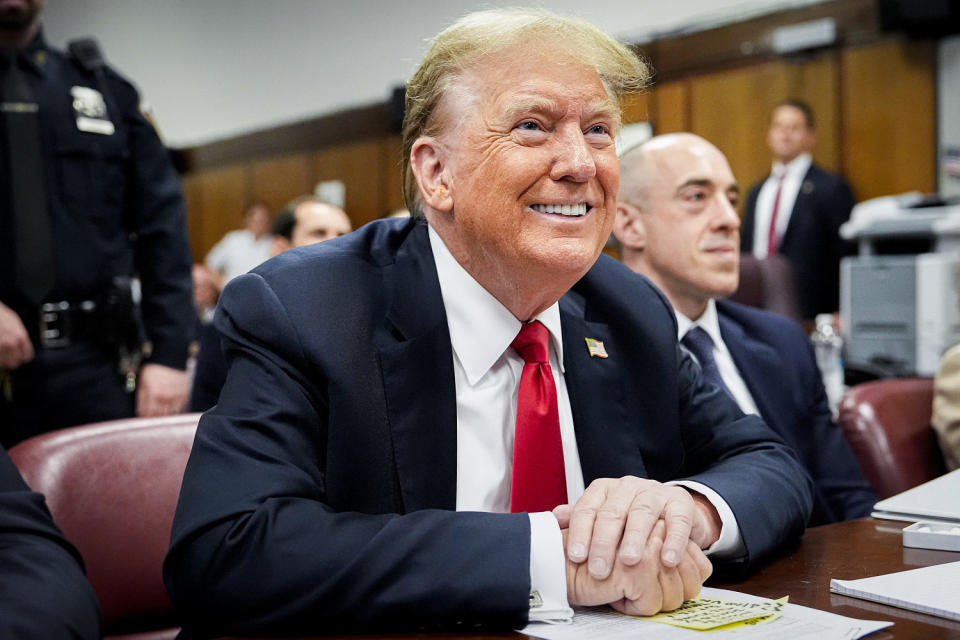A Georgia appeals court on Wednesday officially stayed until at least October the racketeering case alleging Donald Trump and others conspired to illegally overturn the results of the 2020 election — making it impossible for the case to go to trial before November’s elections.
The case had been considered highly unlikely to go trial before Nov. 5 after the Georgia Court of Appeals earlier this year agreed to hear an appeal on whether Fulton County District Attorney Fani Willis and her office should be allowed to remain on the case.
The ruling came the day after the judge presiding over the classified documents case against Trump again reworked the schedule in the case, further lessening the chances that case could go to trial before the election as well.
Trump was convicted of 34 counts of falsifying business records last week in a case brought by Manhattan District Attorney Alvin Bragg and is scheduled to be sentenced on July 11. It appears to be the only one of the four criminal cases against him that will have gone to trial by the end of the year due to the Supreme Court’s decision to take up Trump’s appeal in the fourth case, the federal interference case brought against him by special counsel Jack Smith in Washington, D.C.
In Georgia, the appeals court said earlier this week it would not hear arguments on the appeal by Trump and some of his co-defendants, including his former chief of staff Mark Meadows and Rudy Giuliani, until October. In its Wednesday ruling, the court said the lower court proceedings “are hereby stayed pending the outcome of these appeals.” That timetable would not leave enough time for the case to go to trial before November, given there are a number of legal issues the judge presiding over the case, Scott McAfee, still must sort through.

McAfee had not set a trial date for the case and was not likely to do so while Trump and the others appealed his ruling that Willis could remain on the case provided that Nathan Wade, a special prosecutor she’d appointed to the case and with whom she had a romantic relationship, resigned.
In a motion originally filed by Trump co-defendant Michael Roman, and later adopted by Trump and others, Willis was accused of financially benefiting from her personal relationship with Wade.
Willis and Wade denied any wrongdoing. They acknowledged they’d been in a relationship but maintained that it began after his appointment and that Willis did not benefit financially.
McAfee found no conflict of interest but said because of an “odor of mendacity,” either Willis and her office would have to step aside, or Wade would. Wade resigned that day.
In a statement, Trump attorney Steven Sadow praised the appeals court’s ruling, saying it “properly stayed all proceedings against President Trump in the trial court pending its decision.”
Sadow argued in court in December that the trial should be postponed until after the election — and possibly well after that. He told the judge that if Trump were to be elected again, he would not be able to stand trial until after he’s finished his second stint in the Oval Office because the trial would interfere with his ability to do his job.
Meanwhile in the Florida case, U.S. District Judge Aileen Cannon postponed a hearing she’d scheduled for later this month and has instead scheduled a multi-day hearing on Trump’s argument that Smith, who is also serving as special counsel in that case, was not properly appointed.
Other judges have made short shrift of similar arguments — including the judges presiding over prosecutions brought by special counsel David Weiss against President Joe Biden’s son Hunter Biden in Delaware and California.
In another unusual move, Cannon is also allowing outside groups to join in on the arguments during the day-long hearing on June 21. There will then be more arguments on the topic throughout the day on June 24, with Smith being allowed to argue his motion on a gag order for Trump at the very end of the day. Smith’s prosecutors made the emergency motion arguing that Trump was endangering law enforcement personnel with his false claim that a search warrant executed on his Florida home when he was not there was an attempt to “take me out.”
Cannon’s scheduling order said she’d then hear arguments in a closed hearing on Trump’s complaint that attorney-client privilege in his case should not have been pierced on June 25 — and said the original three-day hearing she’d scheduled for the end of the month will be rescheduled to a later date.
The moves come after her ruling last month scuttling a May 20 trial date indefinitely, given the “myriad” legal issues in the case she still has to work through.
This article was originally published on NBCNews.com


